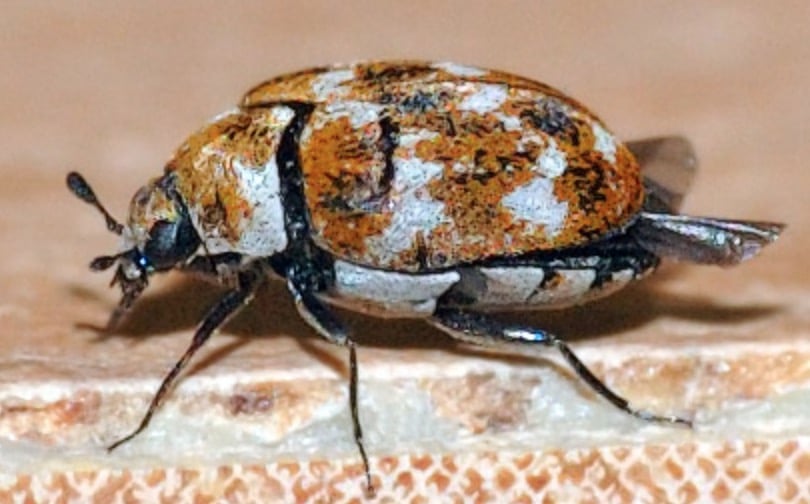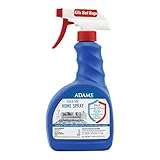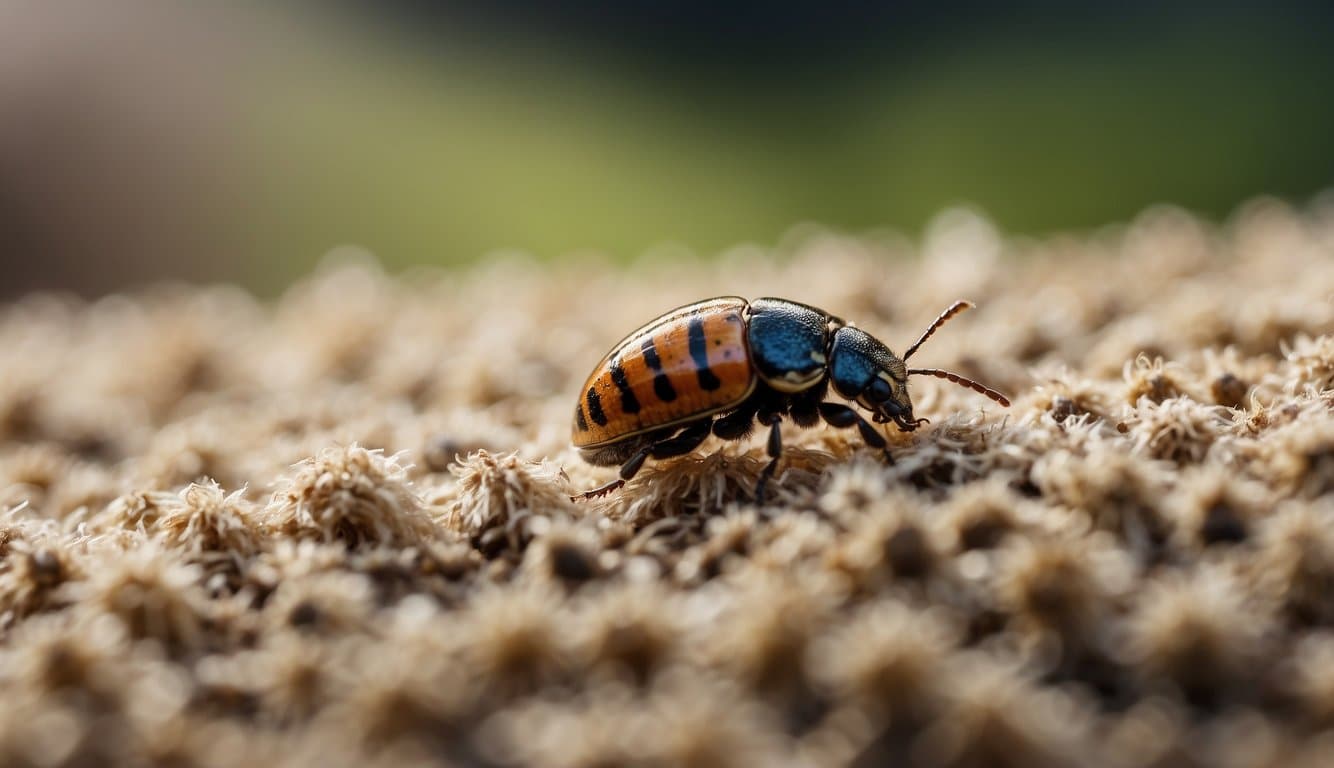Getting Rid of Carpet Beetles: Step By Step
Step 1: Confirm the Presence of Carpet Beetles
- Question: Have you noticed small, oval-shaped beetles, larvae, or damage to fabrics and carpets?
- Yes: Proceed to Step 2.
- No: Continue regular cleaning and inspect occasionally for signs.
Step 2: Identify Infested Areas
- Action: Locate where carpet beetles are concentrated.
- Common Areas: Carpets, closets, drawers with natural fabrics, and areas where pets sleep.
Step 3: Clean Thoroughly
- Action: Deep clean all affected and nearby areas.
- Cleaning Methods:
- Vacuum: Regularly vacuum carpets, furniture, and areas under furniture.
- Steam Cleaning: Steam clean carpets and upholstery to kill larvae and eggs.
- Laundry: Wash all infested fabrics in hot water or have them dry-cleaned.
- Cleaning Methods:
Step 4: Dispose of Infested Items
- Question: Are there heavily infested items that cannot be cleaned?
- Yes: Dispose of these items securely in sealed plastic bags.
- No: Ensure all items are thoroughly cleaned.
Step 5: Use Insecticides
- Question: Do you need to use insecticides?
- Yes: Choose appropriate insecticides for indoor use.
- Types:
- Sprays: Use sprays that are labeled for carpet beetles.
- Powders: Apply insecticidal powders in hidden areas like under carpets and baseboards.
- Types:
- No: Continue with non-chemical methods.
- Yes: Choose appropriate insecticides for indoor use.
Step 6: Use Natural Remedies
- Question: Prefer natural control methods?
- Yes: Implement natural solutions.
- Options:
- Diatomaceous Earth: Apply to affected areas to dehydrate and kill the beetles.
- Cedar Oil: Use as a repellent in areas prone to carpet beetle infestations.
- Options:
- Yes: Implement natural solutions.
Step 7: Prevent Re-infestation
- Action: Take measures to prevent future infestations.
- Preventive Measures:
- Seal Entry Points: Check and seal cracks around windows, doors, and baseboards.
- Proper Storage: Store clothing and fabrics in airtight containers.
- Regular Inspection: Periodically check for signs of re-infestation, especially in hidden areas.
- Preventive Measures:
Step 8: Regular Cleaning and Monitoring
- Routine Actions:
- Regular Cleaning: Maintain a high level of cleanliness, especially in areas prone to fabric pests.
- Monitor: Keep an eye out for new signs of carpet beetles and act immediately if found.
Additional Tips
- Consider using pheromone traps to monitor carpet beetle activity in susceptible areas.
- Be diligent about pet bedding and areas where pet hair accumulates, as these can be hotspots for carpet beetle larvae.
Identifying Carpet Beetles
Ah, carpet beetles, the uninvited little critters that can turn your soft carpets into their personal snack bars. Identifying them is your first step in saying adios to these pesky insects.
Here’s a quick field guide to spot these home invaders:
- Size: These tiny bugs are often no larger than the tip of a pen. Adult beetles measure between 1.5 to 4 millimeters in length.
- Shape: Round, like a wee little armored tank with a set of six legs ready to march through your fabrics.
- Color: Carpet beetles come in a fashion show of patterns. Typically, they boast a palette of black, white, brown, and sometimes orange scales. Look for their distinctive mottled colors, not to be confused with the singular tone of their bedbug cousins.
- Larvae: The larvae might remind you of a tiny, woolly bear caterpillar, elongated with bristles or hair, and these fellas are the main culprits when it comes to damage.
Now, where should you cast your eyes to spot these dapper destroyers?
- Check clothing and upholstered furniture; these insects are fashion aficionados who love natural fibers.
- Your lush carpets? Oh yes, they’re like five-star resorts for beetle babies.
- Scout around windows and doorways; adult beetles like to come and go as they please, often attracted by light.
Remember, consistent visibility patrols are key in catching these beetles red-handed.
If you spot them, get ready to take the next steps to protect your home.
If you’re still unsure, Bob Vila has got an excellent collection of visuals to help you pin down your suspect. Happy hunting!
Natural Remedies
When combating carpet beetles, embracing natural remedies not only helps you rid your home of these pests but also keeps your environment free from harsh chemicals. Let’s dive into the specifics with some effective strategies.
Daily Vacuuming
- Commit to Regular Cleaning: Ensuring you vacuum your home daily is a potent way to prevent and control carpet beetle infestations.
Focus on:
- Carpeted areas
- Upholstered furniture
- Curtains and fabric drapes
- Corners and closet floors
- Empty the Vacuum Outside: After vacuuming, it’s crucial to dispose of the vacuum bag or empty the canister outside your home to avoid any beetles from crawling back out.
Essential Oil Treatments
- Create a Natural Repellent Spray: Mix a few drops of essential oils like peppermint or clove with water and spritz on textiles. These oils are known to deter carpet beetles.
- Use Neat for Intense Infestations: Apply essential oils directly onto infested areas for more severe infestations. Just be sure to test the fabric for colorfastness first!
Diatomaceous Earth Application
- Sprinkle Diatomaceous Earth: This naturally occurring, fine powder can be sprinkled over carpeted areas where beetles are a problem. It works by:
- Dehydrating the insects
- Causing damage to their exoskeletons
- Pay Attention to Application: For the best results, leave the diatomaceous earth for a couple of days before vacuuming it up, reapplying as necessary to ensure all larvae and beetles are addressed.
Remember, reapplying these natural solutions and maintaining consistency are key to preventing a future comeback of these persistent pests.
Keep your fun-loving outdoor spirit alive by defending your indoor oasis with these nature-inspired tactics!
Chemical Solutions
When you’re up against carpet beetles, chemical treatments can be your ace in the hole. Let’s plunge right into the arsenal you have at hand to combat these pesky invaders!
Insecticide Sprays
- Choose the Right Product: Look for sprays labeled specifically for carpet beetles. Pyrethrins and permethrins are common active ingredients that are effective against these insects.
- Application Tips:
- Spray infested areas thoroughly.
- Pay attention to cracks, crevices, and carpet edges.
- Reapply according to the product’s instructions, usually every two weeks until no signs of beetles are apparent.
Insect Growth Regulators
- Target the Larvae: Insect growth regulators (IGRs) work by disrupting the life cycle of carpet beetles, preventing larvae from maturing into breeding adults.
- How to Use:
- Apply IGRs to carpets, upholstery, and inside closets.
- It may take several weeks to notice results, as IGRs are more of a long-term solution.
Preventive Measures
Before diving into battle against these pesky invaders, know that prevention is your prime strategy. A clean home and vigilant storage are your armor and shield against carpet beetles.
Regular Cleaning
- Vacuum Vigorously: Your vacuum is your best friend. Hit the carpets, upholstered furniture, and even drapes with gusto.
Get into those nooks and crannies where carpet beetles love to hide and lay eggs.
- Routinely Rotate: Every week, change up your cleaning routine.
- Areas often overlooked—such as under the bed or behind the couch—are critical zones where carpet beetles might congregate.
Proper Storage Practices
- Seal it Up: Clothing, especially natural fibers, are carpet beetle caviar. Store garments in airtight containers and toss in some lavender sachets for good measure.
- Keep Dry Goods Dry: Pantry items can be a carpet beetle banquet. Ensure grains, pet food, and other dry goods are buttoned up tight in sealed bins or jars.
Professional Extermination
When your home turns into a playground for carpet beetles, it’s time to call in the cavalry — professional exterminators! These are the folks who bring out the big guns to tackle your beetle battle.
Step Right Up:
- Identify the Problem: Professionals start by confirming that it’s carpet beetles you’re dealing with, and not some other pesky intruder.
- Assessment: They’ll scope out the extent of the infestation, checking all the nooks and crannies carpet beetles love.
- Battle Plan: Based on the survey, you’ll get a customized plan of attack.
Choose Your Weapons:
- Insecticides: Pros might use powerful, targeted chemicals that are tough on beetles but safe for you.
- Heat Treatment: Cranking up the heat can send these bugs packing for good.
Aftermath Actions:
- Monitoring: To ensure those critters are gone for good, they’ll set up a system to keep an eye on potential returnees.
- Prevention Tips: You’ll get professional advice to avoid future invasions.
Remember:
- Go for licensed and experienced pros — these folks know their beetle-busting stuff.
- While DIY methods exist, severe cases need severe measures that only experts can provide.
Frequently Asked Questions
In this section, you’ll find straightforward answers to your burning questions on tackling carpet beetle infestations with practical solutions and preventative tips.
What natural remedies can help in managing carpet beetle infestations?
Natural remedies like essential oils, including peppermint and clove, can act as effective deterrents for carpet beetles.
Regularly laundering affected fabrics with hot water can also remove these persistent pests.
Explore various options on Amazon that might suit your needs.
How can I effectively tackle a carpet beetle larva problem?
One of the best ways to tackle a larva problem is by thorough vacuuming of carpets, upholstered furniture, and hiding spots, followed by disposing of the vacuum bag immediately.
For items that can’t be washed, consider heat treatment such as steam cleaning to kill the larvae. These methods also help remove the source of their food.
What could be attracting carpet beetles to my home?
Carpet beetles are attracted to natural fibers and can often be brought into homes on cut flowers or through open windows.
They feast on a variety of items in your home, including wool, silk, leather, fur, hair, and food scraps.
It’s important to regularly clean and remove these attractants to lower the chances of an infestation.
Are there any health risks associated with carpet beetles?
While carpet beetles themselves aren’t harmful to human health, some people may experience allergic reactions due to the bristly hairs of the larvae.
If you have sensitive skin, be cautious and consider wearing gloves when handling infested items.
Can vinegar be used as a treatment for carpet beetle issues?
Yes, vinegar can be a useful treatment.
Spraying white or apple cider vinegar on rugs, carpets, and upholstered furniture can help to repel carpet beetles and disrupt their lifecycle.
Check out Bob Vila’s advice for detailed uses of vinegar against carpet beetles.
What steps can I take to eliminate carpet beetles from my vehicle?
To eliminate carpet beetles from your vehicle, start by thoroughly vacuuming the interior, including carpets and upholstery.
If possible, leave your car in the sun with windows closed to increase heat, which can kill lingering beetles and larvae.
Regular cleaning and minimizing clutter can also prevent future infestations.
Last update on 2024-05-20 / Affiliate links / Images from Amazon Product Advertising API





